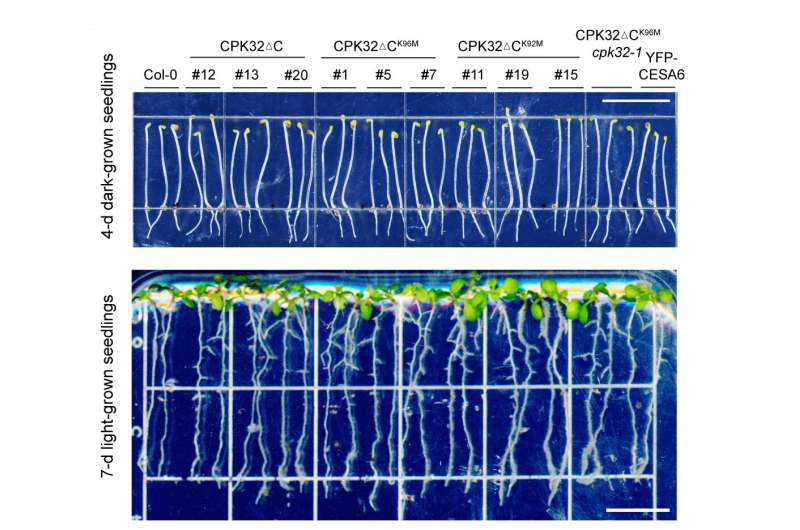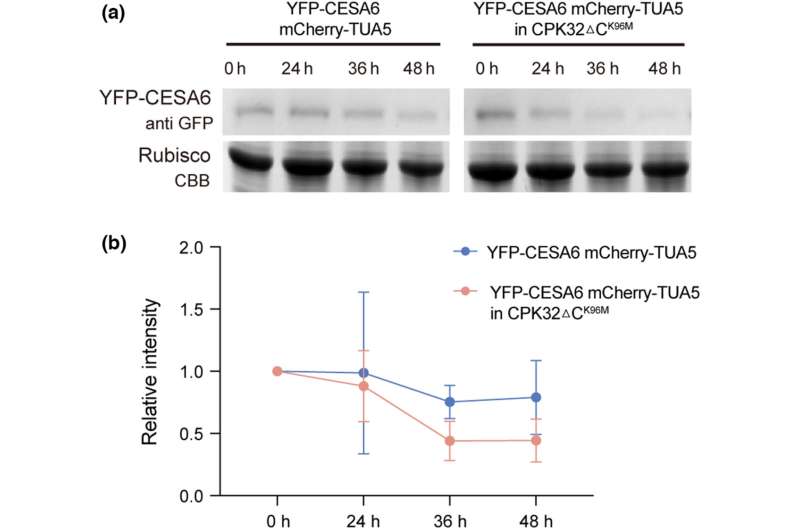This article has been reviewed according to Science X's editorial process and policies. Editors have highlighted the following attributes while ensuring the content's credibility:
fact-checked
peer-reviewed publication
trusted source
proofread
Newly identified protein regulates the creation of cellulose in plant cells

Cellulose—an integral component of plant cell walls—is an important source of food, paper, textiles and biofuels, but how its creation is regulated within plant cells has remained unclear. Now, a team led by researchers at Penn State has identified a protein that modifies the cellular machinery responsible for producing cellulose, which ultimately lends stability to that machinery. This new understanding could inform the design of more stable, cellulose-enriched materials for biofuels and other functions.
Within a plant cell, a complex of proteins called the cellulose synthase complex builds a chain of cellulose. Regulation of this process determines a variety of properties like when and how quickly it occurs as well as the length of the cellulose chain.
"Cellulose is the most abundant biopolymer on Earth, yet despite its importance, relatively little is known about how its synthesis is regulated," said Ying Gu, professor of biochemistry and molecular biology in the Penn State Eberly College of Science and leader of the research team. "In this study, we identified a protein called calcium-dependent protein kinase 32 (CPK32) and confirmed that it chemically modifies one of the proteins in the cellulose synthase complex, ultimately helping to regulate the cellulose biosynthesis process."
The researchers published their findings in the journal New Phytologist.
The chemical modification carried out by the CPK32 protein is called phosphorylation; it adds a chemical compound known as a phosphor group to the cellulose synthase protein CESA3. These types of modifications are reversible and support a variety of important biological functions in the cell.

In humans, more than 200,000 locations on proteins can be phosphorylated by more than 500 proteins, which are called kinases. In the plant Arabidopsis, also known as thale cress and commonly used in plant science, more than 43,000 locations can be phosphorylated by more than 1,000 kinases.
"Identifying which of the many kinases could phosphorylate cellulose synthase was very daunting," said Gu. "We used a screening approach to look for proteins that directly associate with CESA3. This revealed the kinase CPK32, and we followed up with a series of experiments to confirm that CPK32 actually phosphorylates CESA3, to identify the specific location on CESA3 where this occurs, and to determine how this phosphorylation impacts the plant."
The researchers then created a version of the CESA3 protein with a mutation that altered the site where the phosphor group is added, preventing phosphorylation. Cells of the mutated plants—where phosphorylation of CESA3 was not possible—had reduced cellulose content and reduced stability of the cellulose synthase complex, and adult plants of mutated plants had stunted growth.
"Previous studies have shown CPK32 plays a role in several biological processes, including pollen tube growth as well as shoot and root development," said Gu. "Here, we demonstrate a new function of CPK32 and a novel mechanism of phosphorylation in stabilizing the cellulose synthase complex."
Next, the researchers plan to investigate whether the phosphorylation of CESA3 is unique to CPK32 or if any other kinases within the same family can similarly regulate cellulose biosynthesis.
"By regulating the stability of the cellulose synthase complex, we may be able to encourage cells to produce longer cellulose chains and ultimately engineer cellulose-rich materials," said Gu.
More information: Xiaoran Xin et al, CALCIUM‐DEPENDENT PROTEIN KINASE32 regulates cellulose biosynthesis through post‐translational modification of cellulose synthase, New Phytologist (2023). DOI: 10.1111/nph.19106
Journal information: New Phytologist
Provided by Pennsylvania State University



















